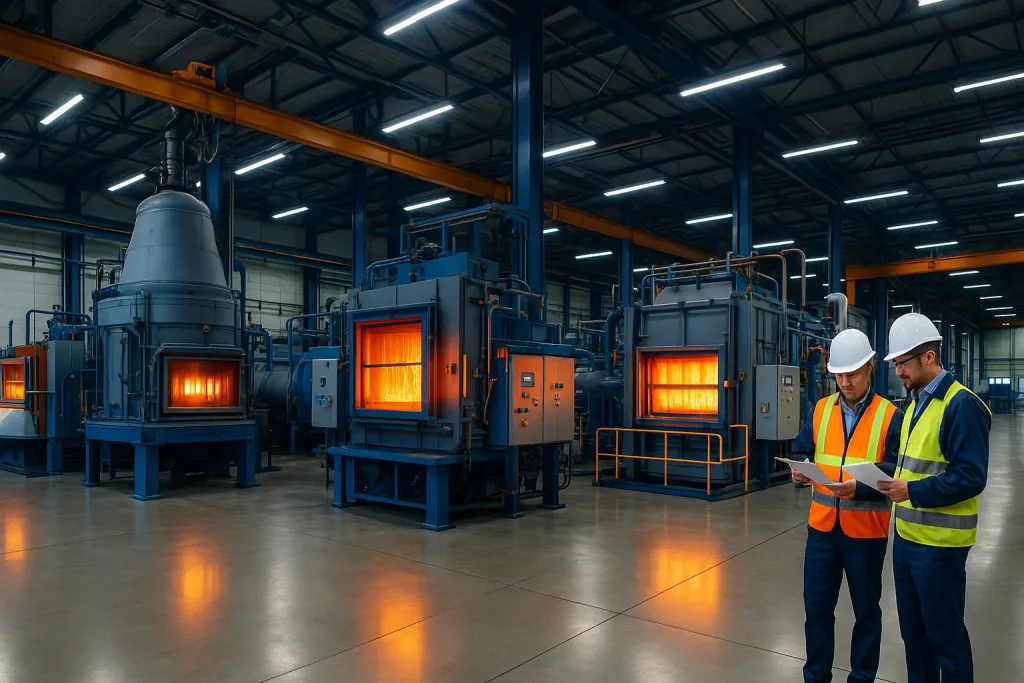
Questions to Consider Before Purchasing Furnaces
Investing in an industrial furnace represents one of the most significant capital expenditures your manufacturing facility will make. With costs ranging from thousands to millions of dollars, and operational lifespans extending decades, choosing the wrong furnace can incapacitate productivity and drain profits for years to come.
This comprehensive checklist empowers you to make data-driven decisions that align with your operational goals, budget constraints, and long-term growth strategy.
Technical Specifications & Performance
1. What Temperature Range and Uniformity Does Your Process Actually Require?
Understanding your exact temperature requirements prevents over-specification and unnecessary costs. Document your minimum, maximum, and optimal operating temperatures, plus acceptable temperature variations across the heating chamber.
2. How Will Atmosphere Control Impact Your Product Quality?
Different materials require specific atmospheric conditions. Steel components may need neutral atmospheres to prevent oxidation, while aluminium parts often require controlled environments to achieve optimal metallurgical properties.
3. What Are the Precise Dimensions and Weight Limits for Your Components?
Chamber dimensions must accommodate your largest parts with adequate clearance. Consider future product lines and potential growth when evaluating size requirements.
Energy Efficiency & Operating Costs
4. What Is the Furnace’s Energy Consumption Per Cycle?
Request detailed energy consumption data, including startup, operation, and cooldown phases. Calculate annual operating costs based on your local utility rates and production volume.
5. How Does Insulation Quality Affect Long-Term Operating Expenses?
Superior refractory materials and insulation design significantly reduce heat loss. Compare thermal efficiency ratings and payback periods for premium insulation options.
6. What Maintenance Schedule and Costs Should You Expect?
Understanding preventive maintenance requirements helps budget for ongoing operational expenses. Request detailed maintenance protocols and replacement part costs.
Customization & Integration
7. Can the Furnace Be Customized for Your Specific Applications?
Standard furnaces rarely meet unique manufacturing requirements. Evaluate the manufacturer’s custom engineering capabilities and previous experience with similar applications.
8. How Will the System Integrate with Your Existing Production Line?
Consider material handling systems, automation interfaces, and workflow integration. Poor integration can create bottlenecks that negate the benefits of furnace performance.
9. What Control System Options Are Available?
Modern digital control systems offer precise temperature management, data logging, and remote monitoring capabilities. Evaluate user interfaces and integration with plant management systems.
Safety & Compliance
10. Does the Furnace Meet All Relevant Industry Standards?
Verify compliance with safety regulations, including OSHA, NFPA, and industry-specific standards. Non-compliant equipment can result in costly retrofits or operational shutdowns.
11. What Safety Features Are Included as Standard vs Optional?
Essential safety systems include emergency shutoffs, over-temperature protection, and gas leak detection. Don’t compromise on safety features to reduce initial costs.
12. How Does the Design Address Environmental Regulations?
Emission control systems and environmental compliance become increasingly critical. Evaluate exhaust treatment options and regulatory reporting capabilities.
Vendor Evaluation & Support
13. What Is the Manufacturer’s Track Record with Similar Applications?
Research the vendor’s industry experience and client references. Companies with proven expertise in your specific sector, like Precons Furnaces with their four-decade track record serving aerospace and nuclear industries, offer invaluable application knowledge.
14. What Warranty Coverage and Technical Support Are Provided?
Comprehensive warranty terms should cover major components for reasonable periods. Evaluate technical support availability, response times, and field service capabilities.
15. How Quickly Can Installation and Commissioning Be Completed?
Project timelines directly impact production schedules and revenue. Request detailed installation schedules including utility requirements, foundation specifications, and commissioning procedures.
Making Your Final Decision
Armed with answers to these critical questions, you can confidently evaluate proposals and select furnace systems that deliver optimal performance, reliability, and return on investment. Remember that the lowest initial price rarely represents the best long-term value.
Ready to make an informed furnace purchase decision?
Contact Precons Furnaces today for expert consultation and customised solutions backed by over 40+ years of industrial heating expertise. Our engineering team will help you navigate these critical questions and specify the perfect furnace system for your unique requirements. Transform your manufacturing capabilities with precision-engineered furnace solutions. Connect with our furnace specialists to discuss your specific requirements and receive a detailed proposal tailored to your application needs.